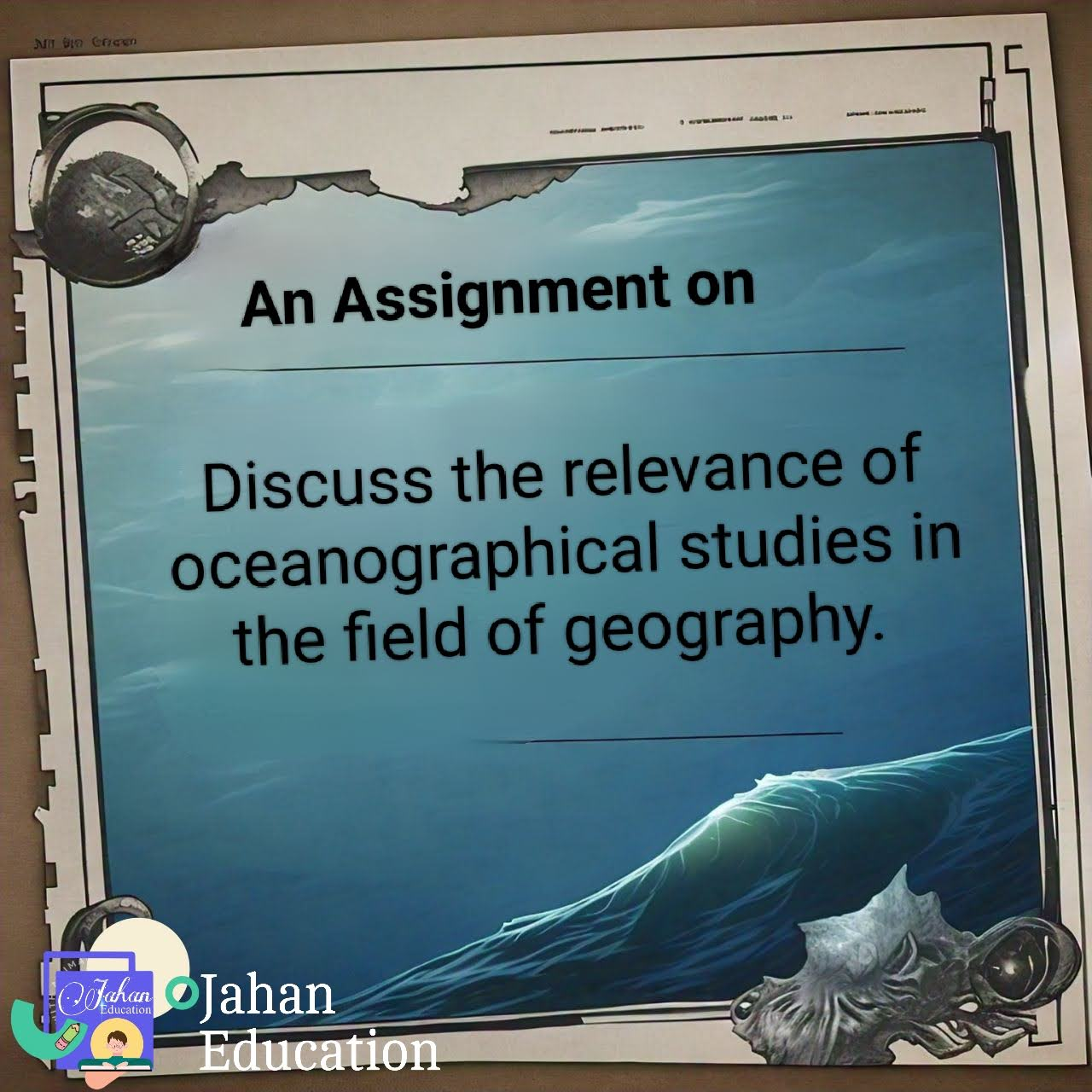[First Page]
An Assignment on
"Discuss the Relevance of Oceanographical Studies in the Field of Geography"Submitted to
Instructor's name : ___
Department name : ____
Date : __/__/__
Submitted by
Your name : ___
Course name and code : ___
Roll no. : ___
Regd no. : ___
College : ___
[New Page]
Introduction :
Oceanography, the scientific study of the physical and biological aspects of the ocean, plays a pivotal role in the field of geography. Geography, encompassing the study of the Earth's surface, its physical features, and the human activities that shape it, is inherently intertwined with the ocean. This paper will explore the significance of oceanographical studies in advancing our understanding of various geographical phenomena, including climate patterns, coastal processes, and human-ocean interactions.
The Ocean as a Key Geographical Feature :
The ocean covers approximately 71% of the Earth's surface, making it the largest and most influential geographical feature. Its vastness and complexity necessitate specialized study to comprehend its impact on the planet. Oceanographical studies provide valuable insights into the ocean's physical properties, such as temperature, salinity, currents, and tides, as well as its biological components, including marine ecosystems and biodiversity.
Oceanography and Climate Studies :
The ocean plays a crucial role in regulating the Earth's climate. Ocean currents transport heat and moisture around the globe, influencing temperature patterns and precipitation. Oceanographical studies help us understand how changes in ocean temperature, circulation, and chemistry affect climate variability, including phenomena like El Niño and La Niña. Additionally, oceanographic research contributes to climate modeling and prediction, enabling us to anticipate future climate changes and their potential impacts.
Coastal Processes and Oceanographic Studies :
Coastal regions are dynamic environments shaped by the interaction between the ocean and the land. Oceanographical studies are essential for understanding coastal processes, including erosion, sedimentation, and storm surges. By studying ocean currents, waves, and tides, geographers can assess coastal vulnerability and develop strategies for coastal management and protection. Oceanographic data also informs decisions related to coastal development, infrastructure planning, and disaster preparedness.
Human-Ocean Interactions and Oceanographic Research :
Human activities have a significant impact on the ocean, and oceanographical studies provide valuable information for sustainable management and conservation. Fisheries management, marine pollution, and offshore resource exploration are just a few examples of human-ocean interactions that benefit from oceanographic research. By understanding the ocean's ecosystems, biodiversity, and resource potential, we can make informed decisions about how to utilize these resources responsibly and minimize negative impacts.
The Importance of Oceanography in a Changing World :
As highlighted on the National Geographic Society website [1], oceanography plays a critical role in addressing the challenges facing our planet's oceans. Pollution from human activities, including plastic waste and chemical runoff, threatens marine ecosystems and poses a significant risk to human health. Climate change is also having a profound impact on the ocean, with rising sea levels, warming waters, and ocean acidification disrupting delicate ecological balances.
Oceanographic research is at the forefront of efforts to understand and mitigate these threats. Oceanographers are developing innovative technologies to monitor ocean health, track pollution sources, and assess the impacts of climate change. They are also working to develop sustainable fishing practices and explore alternative energy sources from the ocean, such as wave and tidal power.
By providing vital data and scientific insights, oceanography empowers policymakers, businesses, and communities to make informed decisions about the use and conservation of our oceans.
Conclusion :
Oceanographical studies are indispensable for understanding the Earth's geography. From climate regulation to coastal processes and human-ocean interactions, the ocean plays a vital role in shaping our planet. By studying the ocean's physical, biological, and chemical properties, geographers can gain valuable insights into a wide range of geographical phenomena. As the human population continues to grow and our reliance on the ocean increases, the importance of oceanographic research will only become more pronounced.
[New Page]
Reference :- Google-Gemini
- Jahan Education
- National Geography
[E N D]
Updated on 11th September 2024By :- J.A.C (B.Sc Honours | Web/App Developer.)

.jpg)

.jpg)













0 Comments